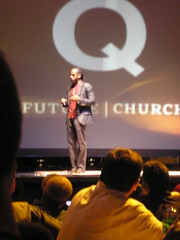Q: Jeff Johnson | Hip-Hop
 Jeff Johnson educated me. He took us through the ins and outs of the history of hip-hop culture and its effect on global culture in 18 minutes. I don’t really feel at all adequate to go through and try to detail that history… but wow. He knows his stuff.
Jeff Johnson educated me. He took us through the ins and outs of the history of hip-hop culture and its effect on global culture in 18 minutes. I don’t really feel at all adequate to go through and try to detail that history… but wow. He knows his stuff.
He talks about how in other countries, where they don’t even have MTV, where they are in the midst of civil war, you can find G-UNIT written in graffiti or purchase Eminem posters. How has hip-hop gotten to a point where it is spread across the world, even where the music isn’t supposed to be available?
Hip-hop came out of a post-civil rights movement; the integration was happening, but the economic benefits had yet to reach the black youth of the day. They were disenfranchised and had no voice; so they created the voice of hip-hop. Suddenly they had a voice.
The problems came first when someone realized they could make a product of that voice and sell it.
The problem now is that, as Johnson puts it, hip-hop is being created by a “post-soul generation.” It used to be that someone in the family had a spiritual influence on the youth; the parents, the aunt, the brother – someone. But now there are people growing up with no one to reel them back in. Now, as Johnson describes it, you have 40-year-old grandmas clubbing with their daughters.
I understood Johnson’s challenge to the church to be to stop excusing and ignoring race and the cultures of the diverse races. We are more comfortable saying Jesus wouldn’t see color instead of dealing with the realities that differences make us great. Johnson suggests there is still racism in the church –that a black person isn’t a “black” person when they’re a part of your church.
The point of hip-hop in our conversation is that it’s an example of how it transcends ethnic and cultural communities without shedding who “I am”. Instead, when we can create together, our diverse backgrounds can add value. Unfortunately, we most often get “urban ministry” that is, and I quote, “suburban ministry in blackface.” The white church needs to “remove the fakeness” – a young black man will see it, because “I am us.”
I really enjoyed this session. Johnson is obviously passionate about his craft and how it creates culture. It was also good to have just a completely different style of speaker than I’m used to. Johnson just oozed with passion and you knew that in those 18 minutes he was telling us the most important things he knew to say to us.
For me, the best thing out of this was the reminder to not ignore race. I need to always remember that other people come from different memories. How I remember church growing up is not how my brother who is Asian remembers it. How I remember celebrating Christmas is not how my sister who is Black remembers it. How I remember my first day on the job is not how my Hispanic neighbor remembers it. There are deeper stories and deeper disconnects there than I might expect. Instead of being afraid of them, we’ve got to rejoice in them; and your story can make my story a better one.